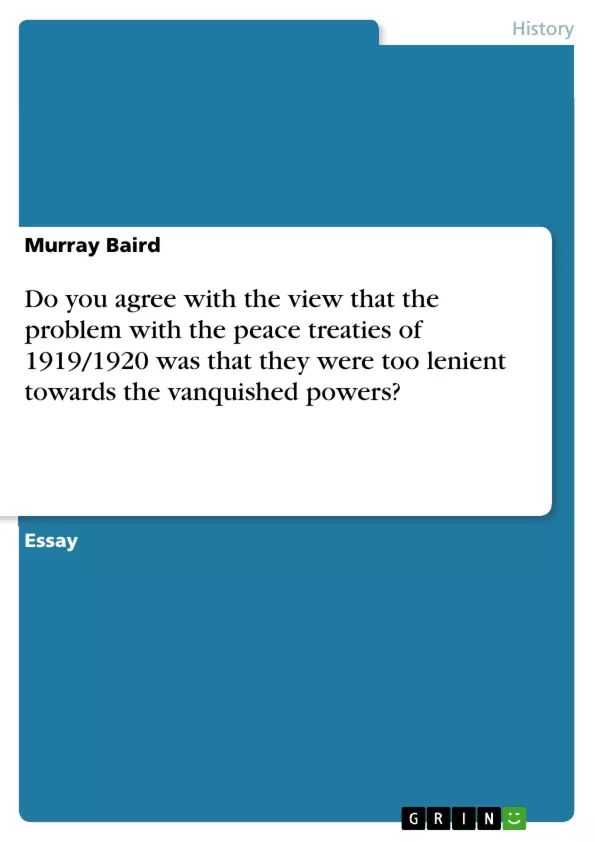The deliberations of the peacemakers between 1919 and 1920 failed to
establish an enduring peace for multifarious reasons, but not because the peace treaties were too lenient towards the vanquished powers. After all, the negotiators did not begin with a blank piece of paper. Rather, certain curbs were placed on them. Technically defeated, but practically unoccupied the Central Powers, and in particular Germany, remained largely intact and the pre-war counterweight to German power in the form of the Russian and Habsburg Empires no longer existed. Concomitantly, encroaching Russian Bolshevism created a dichotomy as to the treatment of the vanquished powers. Moreover, the main players in the peace conferences brought with them not only their varied personalities but also their different aims and aspirations, tempered by domestic political strategy and public opinion. President Wilson’s Fourteen points raised expectations too high and clashed both with reality and the imperialistic aims of other peacemakers. In addition, the imbroglio that was rampant post-war nationalism was neither fully understood nor remedies consistently applied. Finally, the open sore created by the so-called war guilt cause and reparations festered until it became a cancerous growth consuming the very tissue of the peace treaties and simultaneously gave the vanquished nations reasons to break the treaties.
Inhaltsverzeichnis (Table of Contents)
- The Problem with Leniency
- The Limits of Power
- The Shadow of Bolshevism
- The Legacy of Versailles
Zielsetzung und Themenschwerpunkte (Objectives and Key Themes)
This essay examines the peace treaties of 1919/20 and evaluates the argument that they were too lenient towards the defeated powers. The author argues that the treaties were not too lenient, but rather were limited in their ability to create a lasting peace due to a combination of factors.
- The constraints placed on the peacemakers by the pre-war power structure and the emergence of new threats, such as Bolshevism.
- The inability of the Allied powers to fully enforce the treaties due to domestic political pressures and a lack of public support for further conflict.
- The impact of the war guilt clause and reparations on the defeated nations.
- The failure of the peacemakers to create a stable new European order.
- The consequences of the peace treaties for the vanquished powers, particularly Germany.
Zusammenfassung der Kapitel (Chapter Summaries)
The essay explores the complexities of the peace treaties following World War One. It examines the constraints faced by the peacemakers, arguing that the treaties were not too lenient but rather constrained by the realities of the post-war world. The author highlights the inability of the Allies to fully enforce the treaties and the impact of Bolshevism on the peace process. The essay focuses on the challenges of establishing a new European order and the lasting consequences of the Versailles Treaty for Germany and the other vanquished powers.
Schlüsselwörter (Keywords)
The essay focuses on key concepts such as the Treaty of Versailles, the peace process after World War One, the Allied powers, the defeated powers, Bolshevism, reparations, war guilt, and the European balance of power.
Frequently Asked Questions
Were the 1919/1920 peace treaties too lenient towards Germany?
The author argues they were not too lenient. Instead, multifarious reasons like post-war nationalism and the shadow of Bolshevism prevented an enduring peace.
What role did Bolshevism play in the peace negotiations?
The fear of encroaching Russian Bolshevism created a dilemma: the Allies needed to weaken the vanquished powers but also needed them stable enough to act as a buffer against communism.
Why was the "war guilt clause" so controversial?
The clause, which forced Germany to accept sole responsibility for the war, created deep resentment and gave vanquished nations moral reasons to later break the treaties.
How did President Wilson's Fourteen Points affect the outcome?
Wilson's points raised public expectations very high, but they often clashed with the imperialistic aims of other peacemakers and the complex realities on the ground.
Why could the Allies not fully enforce the peace treaties?
Domestic political strategies and public opinion in the Allied nations made it difficult to sustain the military and economic pressure needed for full enforcement.
- Quote paper
- Murray Baird (Author), 2002, Do you agree with the view that the problem with the peace treaties of 1919/1920 was that they were too lenient towards the vanquished powers?, Munich, GRIN Verlag, https://www.grin.com/document/201887



